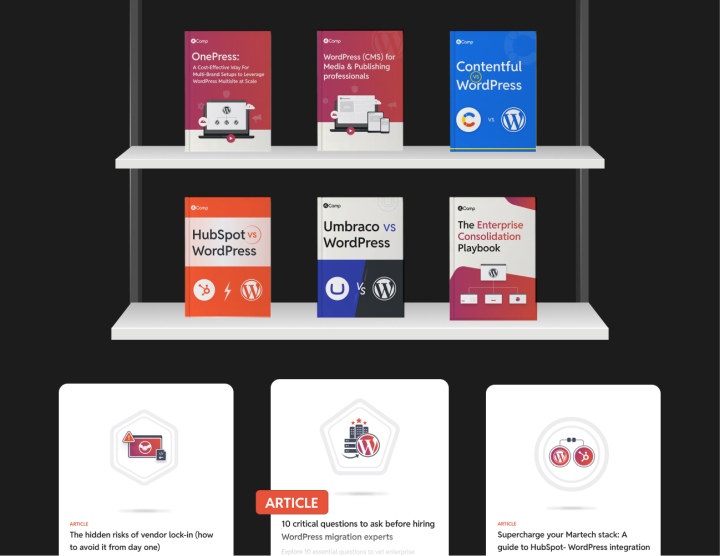Drupal to WordPress migration:Directives to preserve your SEO
In this guide, we share actionable directives to ensure a smooth Drupal and WordPress migration that preserves your hard-earned search engine visibility. Let’s delve into the critical considerations for maintaining your SEO advantage throughout a Drupal to WordPress migration process.
Setting SEO benchmarking
Before embarking on the migration journey, establish a baseline for your current SEO performance. Conduct a comprehensive SEO audit of your Drupal website. This audit should capture:
- XML sitemaps: Analyze your existing XML sitemaps to ensure all URLs are accounted for.
- URL list: Document all current URLs to manage redirects accurately.
- Backlink list: A record of all websites linking back to yours, a crucial SEO factor.
- Metadata list: Titles, descriptions, and other metadata associated with your pages.
- Taxonomy: Record the structure and categorization of your content.
- Keyword ranking and traffic: Track your current rankings for relevant keywords and overall website traffic.
- Page speed and performance report: Analyze your website’s loading speed for both desktop and mobile.
Having this data readily available (preferably in a spreadsheet) allows you to compare your SEO performance before and after the migration. It helps in ensuring a smooth Drupal to WordPress conversion.
WordPress SEO migration
Setting up your new WordPress site with SEO best practices from the start is crucial. Focus on the following areas:
- SEO-compliant design and theme: Develop or choose a WordPress theme that prioritizes SEO best practices and is mobile-responsive. The design should offer a clean and user-friendly experience.
- Accessibility: Accessibility is an important factor in making sure there is enough ease of navigation and comprehension for visitors. It leads to improved engagement and reduced bounce rates.
- WordPress SEO configuration: Utilize built-in WordPress SEO features and consider installing a full-fledged SEO plugin to further enhance optimization.
- No indexing: Verify no-index and no-follow for all the pages, which will be changed on successful Drupal to WordPress migration.
Ensuring URL consistency
One of the most critical aspects of preserving SEO is maintaining consistent URLs. Here’s how to achieve this:
- Configure permalinks: Set up your WordPress permalinks to closely resemble your existing Drupal website URL structure. This minimizes confusion for search engines and users alike.
- 301 redirects: Implement redirects to ensure all traffic from your old Drupal URLs seamlessly reaches the corresponding pages on your new WordPress site. Utilize a redirect management plugin to streamline this process.
- Targeted redirects: Avoid the common pitfall of redirecting everything to a single page. Create targeted redirects for each individual URL.
- Testing and updating: Thoroughly test all your redirects to ensure they function correctly. Update internal links within your content to point to the new WordPress URLs.
- Canonical URLs: Ensure proper placement of canonical URLs on your WordPress pages. These tags inform search engines of the preferred version of a page, preventing duplicate content issues.
- Removing URLs: URLs with outdated or irrelevant content, minimal traffic, and no significant backlinks may be considered for removal before migration.
- 404 error monitoring: Monitor for any 404 (page not found) errors that might arise due to broken links. Create a custom 404-page offering a user-friendly experience and guiding visitors back to your website.
Optimizing content
Now, let’s focus on optimizing website content, when migrating from Drupal to WordPress:
- SEO metadata: Verify your meta tags, titles, and descriptions from Drupal to WordPress accurately from the metadata list gathered during SEO audit. These elements play a significant role in how search engines understand and rank your content.
- Taxonomy maintenance: Maintain your existing taxonomy structure on WordPress and check the categories and tags migrated. This ensures search engines continue to recognize your content categorization.
- Schema: Schema markup provides rich details about your content to search engines, potentially leading to richer search results. If you’re using Schema on your Drupal site, ensure it’s properly updated to WordPress and validated.
- Header tag hierarchy: Maintain the existing hierarchy of header tags (H1, H2, etc.) within your content. This structure signals the importance of different sections to search engines.
- Image alt text: FG Drupal to WordPress retains alt text attributes for your images during the migration. Alt text provides valuable context for search engines and screen readers, improving accessibility.
Backlinks management
Backlinks from other websites act as a vote of confidence for search engines. Here’s how to handle them during Drupal to WordPress migration:
- Backlinks source: Identify the websites linking to your Drupal pages from the SEO audit.
- Informing key websites: If your URLs change significantly, inform key websites linking to you about the upcoming migration. Request them to update their links to point to the new WordPress URLs.
- Backlink updates: Where feasible, proactively update backlinks on other websites to reflect your new WordPress URLs.
Sitemap management
- Multilingual sites: If your website caters to multiple languages, ensure you have separate XML sitemaps for each language using hreflang tags. For example, if your website is available in English, Spanish and Japanese, hreflang tags specify these three versions. This informs search engines of the various language versions of your content and helps them deliver the most relevant results to users. Use plugins like WPML and Polylang to set hreflang tags.
- XML sitemaps update: After you migrate from Drupal to WordPress, update your XML sitemaps through Google Search Console and Bing Webmaster Tools to reflect the new WordPress URLs. This helps search engines discover and index your WordPress website efficiently.
Crawler visibility
Maintaining optimal visibility for search engine crawlers requires updating your robots.txt file and verifying no-index/no-follow tags.
- Robots.txt update: Ensure your robots.txt file, which controls how search engines crawl your website, accurately reflects your WordPress site structure. Update it to allow or disallow crawling of specific URLs as needed, similar to your Drupal settings. Robots.text file can be easily created and managed with a plugin like Yoast and located in the root directory.
- Verify No-Index and No-Follow: Verify that no-index and no-follow tags are applied correctly to avoid deindexing critical pages. On the WordPress dashboard, click Settings>Reading>Search Engine Visibility and check the ‘Discourage search engines from indexing this site’ option.
Post-migration SEO audit
Conduct a comprehensive SEO audit of your migrated website to identify any potential issues and ensure a smooth Drupal to WordPress transition:
- Error checking: Look for any errors or broken links that might hinder user experience or SEO performance.
- Redirect retesting: Retest your 301 redirects to ensure they continue to function flawlessly.
- Schema testing: Utilize Google’s Rich Results Test Tool to ensure your Schema markup is implemented correctly.
- Indexation and crawlability: Verify that search engines can properly index and crawl your new website with Page Indexing Report on Google Search Console.
- Sitemap rescan: Resubmit your updated XML sitemap to search engines (again through Google Search Console and Bing Webmaster Tool) after fixing any identified issues.
- Performance monitoring: Benchmark your website’s page speed and Core Web Vitals performance after migration. Aim for continuous improvement in these metrics.
- Traffic and ranking monitoring: Closely monitor your website traffic and search rankings for any significant fluctuations. This helps identify and address any potential SEO issues that might arise post-migration.
Ongoing WordPress SEO monitoring
Taking your website from Drupal to WordPress can unlock a wealth of benefits, but the migration process itself can be a potential pitfall for your search engine optimization (SEO) efforts.
With the right approach, SEO can be effectively preserved during the migration from Drupal to WordPress. By following the directives outlined above, you can ensure a smooth transition without sacrificing your online presence.
Fortunately, numerous tools and plugins are available within the WordPress ecosystem to assist with ongoing SEO monitoring and maintenance. Utilize these resources to maintain a strong SEO posture for your website.
Seamless Drupal to WordPress migration
Looking for a Drupal to WordPress migration agency? rtCamp can guide you through a seamless platform migration process. Contact us for expert assistance and ensure your SEO remains robust throughout the transition.
On this page








Leave a Reply